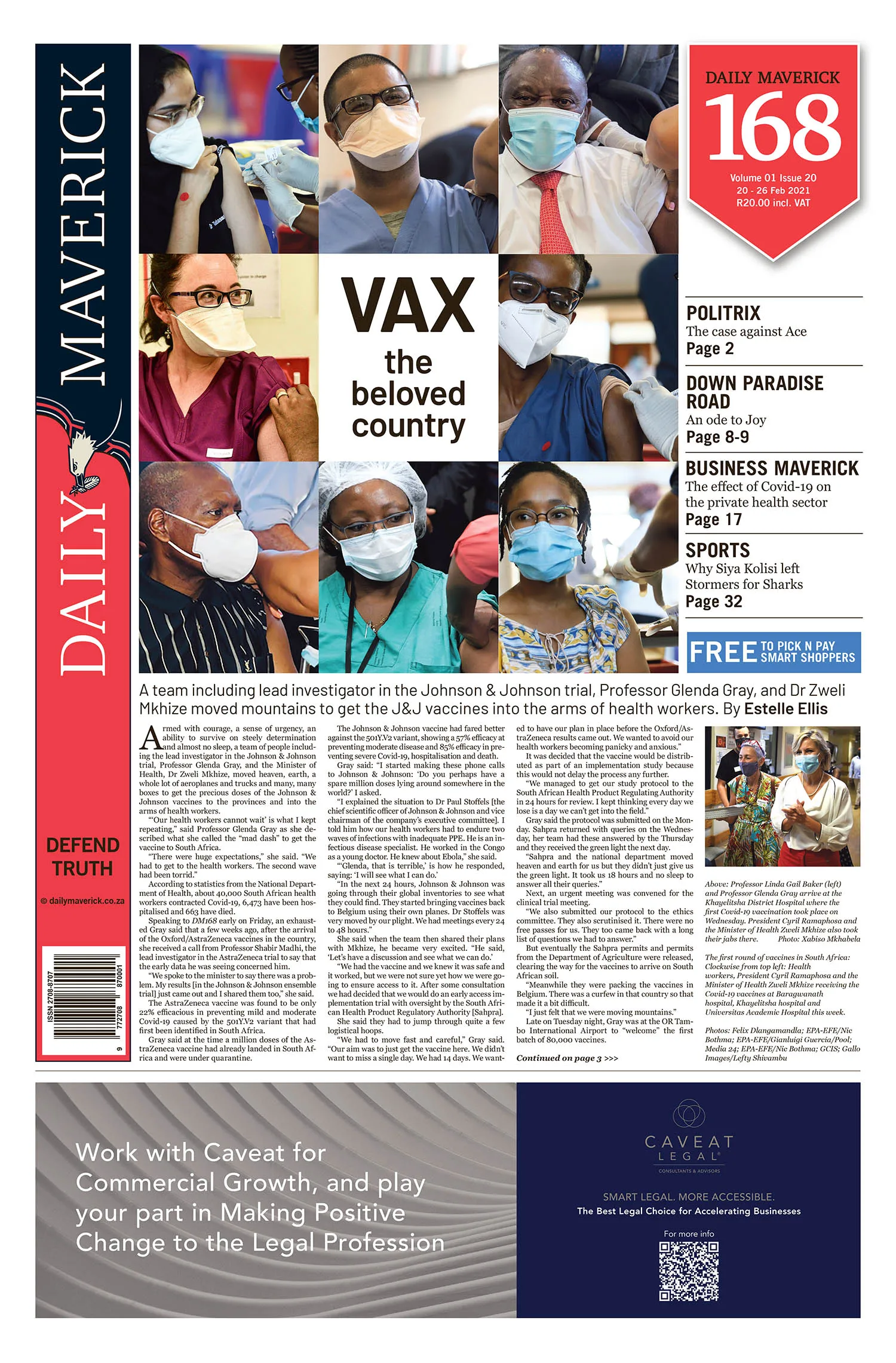First published in the Daily Maverick 168 weekly newspaper.
Nothing too unusual here – this story has been repeated around the world.
But it’s the speed of implementation and the consequent results that are instructive.
Late in 2020 the Israeli government weighed the economic costs of the lockdown against that of vaccinations and embarked on an aggressive campaign to secure vaccines and vaccinate the population.
Since mid-December, and thanks to a data-sharing agreement with pharmaceutical giant Pfizer, the state has vaccinated more than 4 million people (more than 40% of its population), more than 2.6 million of whom have received a second dose.
As the rollout proceeded, hospitals reported a steady decline in seriously ill coronavirus patients and the rate of overall spread. In addition, a study by Israel’s largest health maintenance organisation, Clalit, shows unequivocally that Pfizer’s vaccine is extremely effective in that country, a week after the second dose, mirroring results from the clinical study. Without wasting any time, Israel eased its lockdown. Sporting and cultural events will be open to those who have been fully vaccinated, and everyone is allowed to go to malls and shops. By the end of March, when most of the population over 16 will have been vaccinated, the economy will be completely reopened.
This achievement provides hope (and perhaps a spur) for other countries, where the vaccination effort is gaining momentum. What is welcome is that it is growing beyond the rich developed world. Syrian refugees are now getting shots, the first shipments have just arrived in Zimbabwe and the excitement – and relief – among SA health workers was palpable this week as they started to receive their shots.
Perhaps this should also serve as a timely reminder to governments about what the original purpose of a lockdown was. It was not to prevent people from falling ill – as many governments, but particularly those in the United Kingdom, seem to have forgotten – but to slow the spread of the virus to ensure that hospitals did not become overwhelmed.
After initially dragging its feet to impose lockdown restrictions and enforce rules, the UK is still in the grip of a hard lockdown. Schools will only reopen in mid-March – at the earliest. Yet the UK government estimates it will have vaccinated 15 million people – those aged 70 and over, care-home residents and healthcare workers by 22 February. These groups account for 88% of deaths so far. Other priority groups will be vaccinated by spring.
My point is not to take aim at the UK – although what happens in that economy is extremely relevant to the South African economy and to local investors.
But I do believe that now is the time to reassess lockdown rules, both globally and in SA. None of us has a problem with rules when the evidence supports the rules, or as was the case in the early days of the pandemic, when we simply did not know better. But what we are learning is that rules are often imposed on societies without the scientific evidence to support them.
Take gyms for instance. The benefits of gyms are clear. Regular exercise staves off depression and improves sleep, and staying fit may be a way to avoid a serious case of Covid-19. Yes, there are risks too. Lots of people moving around indoors, sharing equipment and air, and breathing heavily, could be a recipe for easy viral spread.
But even here the risks can be mitigated. Scientists now think surface transmission isn’t driving infection as much as airborne droplets and particles, which means people are not catching the virus from touching a barbell or riding a stationary bike that someone else used. A combination of masks, sanitation and limited numbers makes gyms safer than malls, restaurants, buses, planes and taxis.
In addition, limiting numbers is easier than it was previously, as there’s no longer the usual morning “rush” of people working out before heading to their jobs.
Yet gyms in SA are limited to 50 people, and in the UK and Italy they remain closed.
It’s just one small example among thousands. But what happens at the micro level impacts the macro. Brait, which owns Virgin Active, had already contributed £16-million (of £20-million) in shareholder loans to support the UK, Italy and Asia-Pacific territories. That was in the first lockdown. It seems likely that it is now looking at other ways to support Virgin Active and prop up its balance sheet. In SA, Virgin Active reported in November that it had sufficient liquidity to continue operating. But the pressure must be rising – given the limited access to gyms, it is unsurprising that cancellations are rising and new sales are almost nonexistent.
Meanwhile, the cost of running these businesses has gone up dramatically.
What is also alarming is that governments around the world are no longer listening to reason or engaging with business. In SA this is particularly apparent. At the beginning of the lockdown, in March 2020, government consulted extensively with business and to a lesser extent with labour. They worked in lockstep and there was generally a unity of purpose even if there wasn’t agreement over some of the measures implemented. But as the new year dawned, government reverted to type, and consultations with business have wound down dramatically.
This week the South African government extended its National State of Disaster by another month – to 15 March. If it is to continue to make unilateral decisions under this legislation, the least we can ask for is that these decisions are made on the basis of sound evidence. I’m not always sure that evidence is forthcoming. DM168
This story first appeared in our weekly Daily Maverick 168 newspaper which is available for free to Pick n Pay Smart Shoppers at these Pick n Pay stores.

















 Become an Insider
Become an Insider